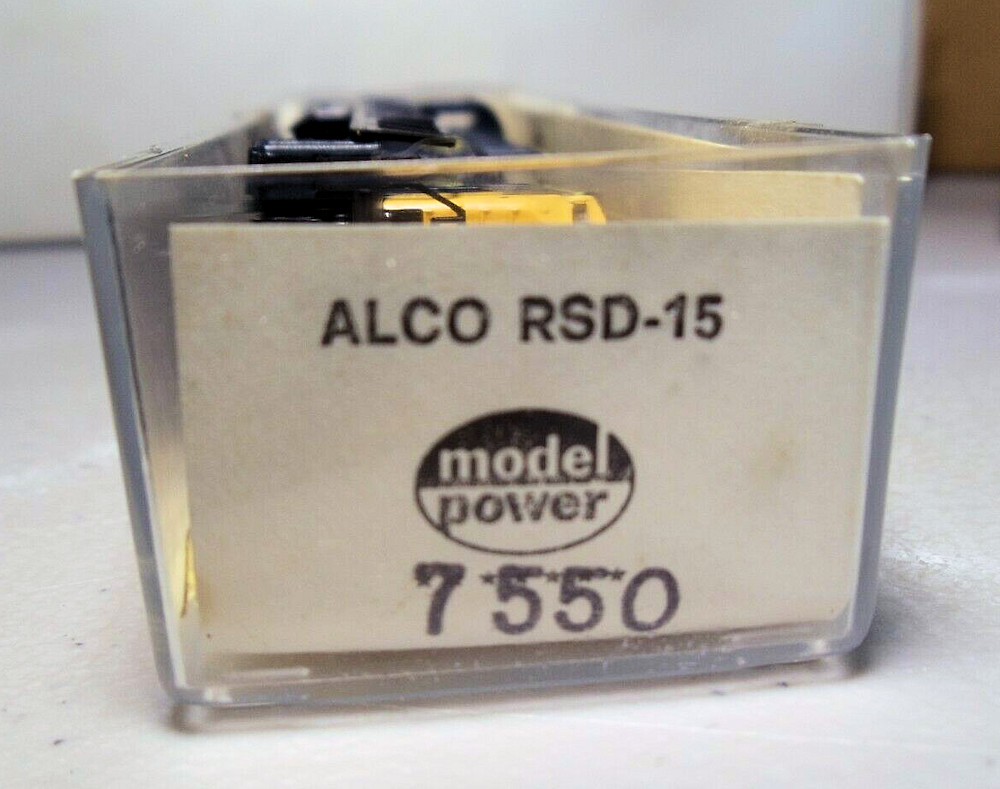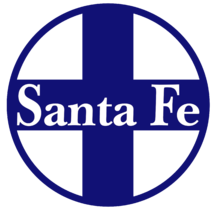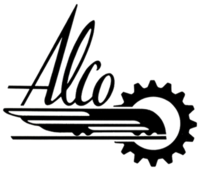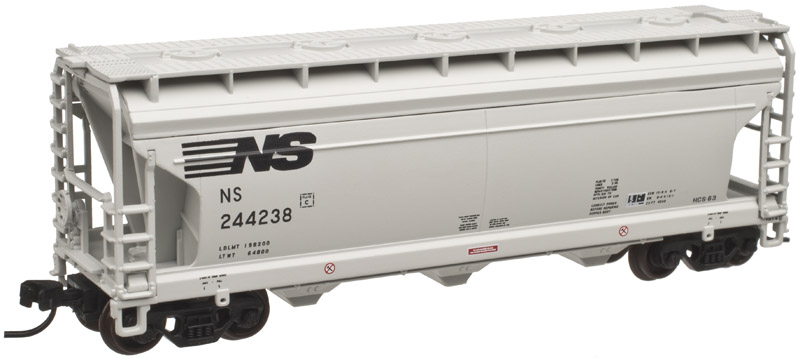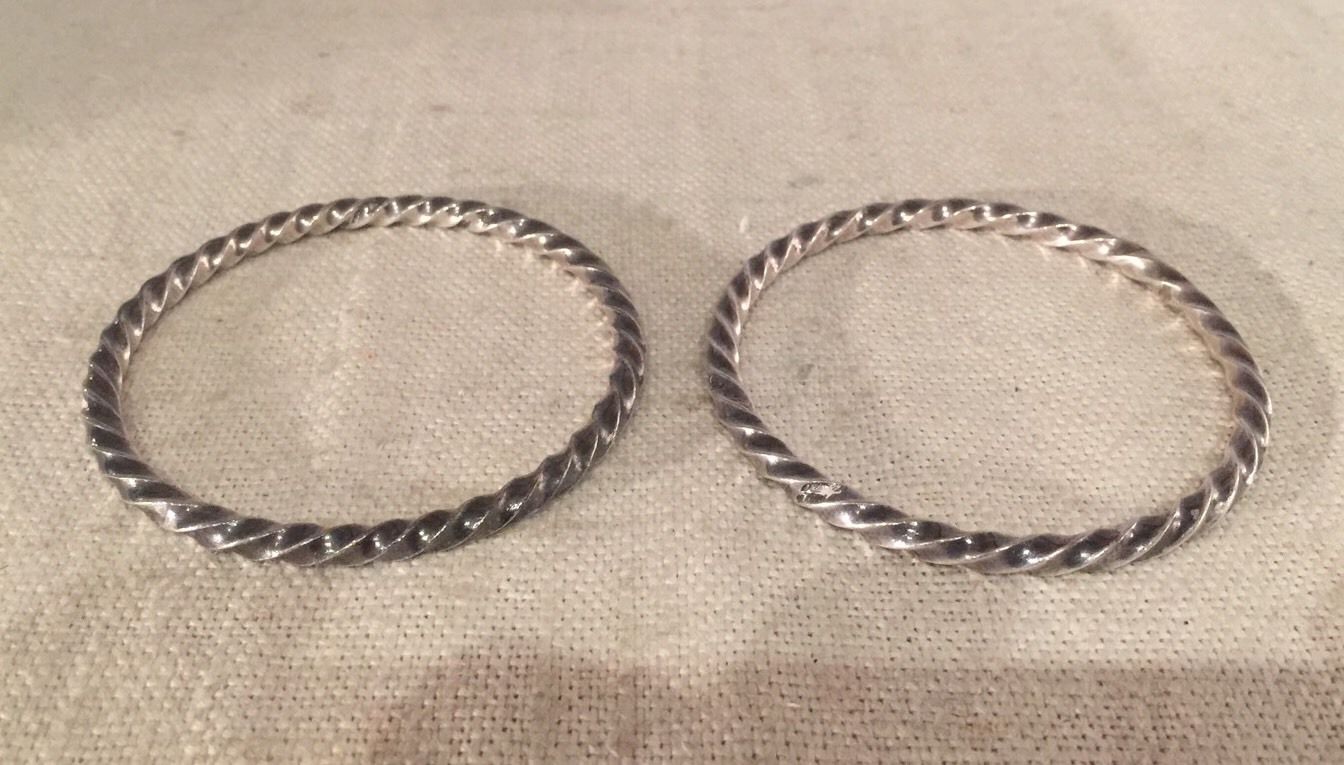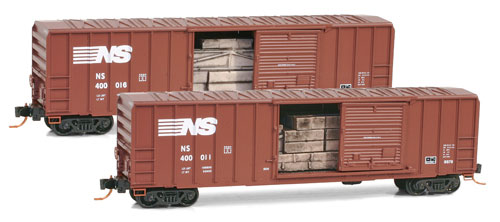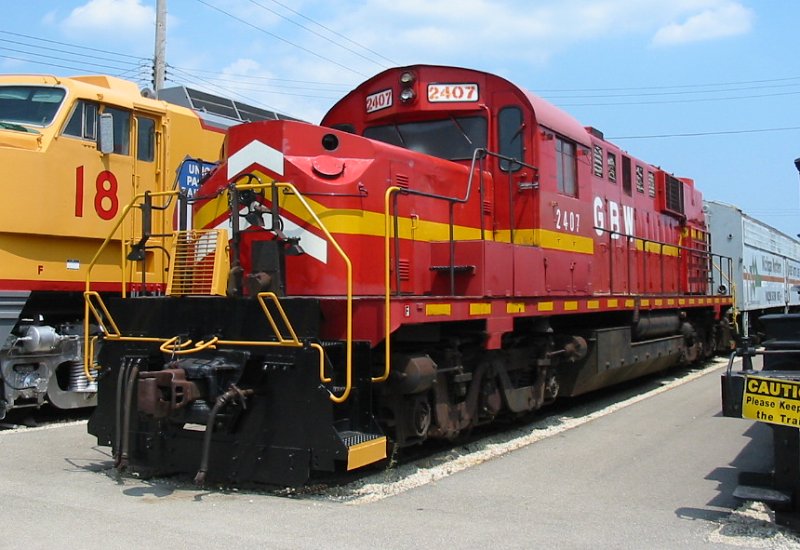Model Information: Mehano made this model for MRC starting in 1969. Model Power started importing this engine after MRC dropped out of N Scale in the 1970s. This model is available both in high-nose and low-nose versions.
DCC Information: The Mehano versions do not support DCC at all.
Prototype History: The ALCO RSD-15 was a diesel-electric locomotive of the road switcher type built by ALCO (the American Locomotive Company) of Schenectady, New York between August 1956 and June 1960, during which time 75 locomotives were produced. The RSD-15 was powered by an ALCO 251 16-cylinder four-cycle V-type prime mover rated at 2,400 horsepower (1.79 MW); it superseded the almost identical ALCO 244-engined RSD-7, and was catalogued alongside the similar but smaller 1,800 hp (1.34 MW) RSD-12, powered by a 12-cylinder 251-model V-type diesel engine.
A single example of the very similar model RSD-17 was built by the Montreal Locomotive Works in 1957 and purchased by the Canadian Pacific (as #8921).
The locomotive rode on a pair of three-axle Trimount trucks, in an AAR C-C wheel arrangement, with all axles powered by General Electric model 752 traction motors. These trucks have an asymmetrical axle spacing because of the positioning of the traction motors. The six-motor design allowed higher tractive effort at lower speeds than an otherwise similar four-motor design. The RSD-15 could be ordered with either a high or low short hood; railfans dubbed the low short hood version "Alligators", on account of their unusually long low noses.
From Wikipedia
A single example of the very similar model RSD-17 was built by the Montreal Locomotive Works in 1957 and purchased by the Canadian Pacific (as #8921).
The locomotive rode on a pair of three-axle Trimount trucks, in an AAR C-C wheel arrangement, with all axles powered by General Electric model 752 traction motors. These trucks have an asymmetrical axle spacing because of the positioning of the traction motors. The six-motor design allowed higher tractive effort at lower speeds than an otherwise similar four-motor design. The RSD-15 could be ordered with either a high or low short hood; railfans dubbed the low short hood version "Alligators", on account of their unusually long low noses.
From Wikipedia
Road Name History: The Atchison, Topeka and Santa Fe Railway (reporting mark ATSF), often abbreviated as Santa Fe or AT&SF, was one of the larger railroads in the United States. Chartered in February 1859, the railroad reached the Kansas-Colorado border in 1873 and Pueblo, Colorado, in 1876. To create a demand for its services, the railroad set up real estate offices and sold farm land from the land grants that it was awarded by Congress. Despite the name, its main line never served Santa Fe, New Mexico, as the terrain was too difficult; the town ultimately was reached by a branch line from Lamy.
The Santa Fe was a pioneer in intermodal freight transport, an enterprise that (at one time or another) included a tugboat fleet and an airline (the short-lived Santa Fe Skyway). Its bus line extended passenger transportation to areas not accessible by rail, and ferryboats on the San Francisco Bay allowed travelers to complete their westward journeys to the Pacific Ocean. The ATSF was the subject of a popular song, Harry Warren & Johnny Mercer's "On the Atchison, Topeka and the Santa Fe", written for the film, The Harvey Girls (1946).
The railroad officially ceased operations on December 31, 1996, when it merged with the Burlington Northern Railroad to form the Burlington Northern & Santa Fe Railway.
Read more on Wikipedia.
The Santa Fe was a pioneer in intermodal freight transport, an enterprise that (at one time or another) included a tugboat fleet and an airline (the short-lived Santa Fe Skyway). Its bus line extended passenger transportation to areas not accessible by rail, and ferryboats on the San Francisco Bay allowed travelers to complete their westward journeys to the Pacific Ocean. The ATSF was the subject of a popular song, Harry Warren & Johnny Mercer's "On the Atchison, Topeka and the Santa Fe", written for the film, The Harvey Girls (1946).
The railroad officially ceased operations on December 31, 1996, when it merged with the Burlington Northern Railroad to form the Burlington Northern & Santa Fe Railway.
Read more on Wikipedia.
Brand/Importer Information: Founded in the late 1960's by Michael Tager, the 3rd generation business specializes in quality hobby products serving the toy and hobby markets worldwide. During its 50 years of operation, Model Power has developed a full line of model railroading products, die-cast metal aircraft, and die-cast metal cars and trucks.
In early 2014, Model Power ceased its business operations. Its extensive portfolio of intellectual property and physical assets are now exclusively produced, marketed, sold, and distributed by MRC (Model Power, MetalTrain and Mantua) and by Daron (Postage Stamp Airplanes and Airliner Collection).
In early 2014, Model Power ceased its business operations. Its extensive portfolio of intellectual property and physical assets are now exclusively produced, marketed, sold, and distributed by MRC (Model Power, MetalTrain and Mantua) and by Daron (Postage Stamp Airplanes and Airliner Collection).
Manufacturer Information: Mehano is a Slovenian toy manufacturer located in Izola, Slovenija. The company was founded as Mehanotehnika and was producing toys starting in June 1953. They first exhibited at the Nuerenberg Toy Fair in 1959. Mehano produced a number of different locomotives and rolling stock models for the North American market in the 1960s and 1970s. Companies such as Atlas and Life-Like imported a huge variety of their products. Generally they can easily be recognized as they are stamped "Yugosolavia" on the underframe. The company was formally renamed "Mehano" in 1990. Izola today is part of the country of Slovenia since the breakup of Yugoslavia.
Mehano filed for bankruptcy in 2008, but still continued to exist and operate. Since 2012, Mehano products are distributed by Lemke.
Mehano filed for bankruptcy in 2008, but still continued to exist and operate. Since 2012, Mehano products are distributed by Lemke.
Item created by: bluedragon0 on 2017-12-30 20:14:42. Last edited by klausnahr on 2021-04-25 14:45:04
If you see errors or missing data in this entry, please feel free to log in and edit it. Anyone with a Gmail account can log in instantly.
If you see errors or missing data in this entry, please feel free to log in and edit it. Anyone with a Gmail account can log in instantly.



